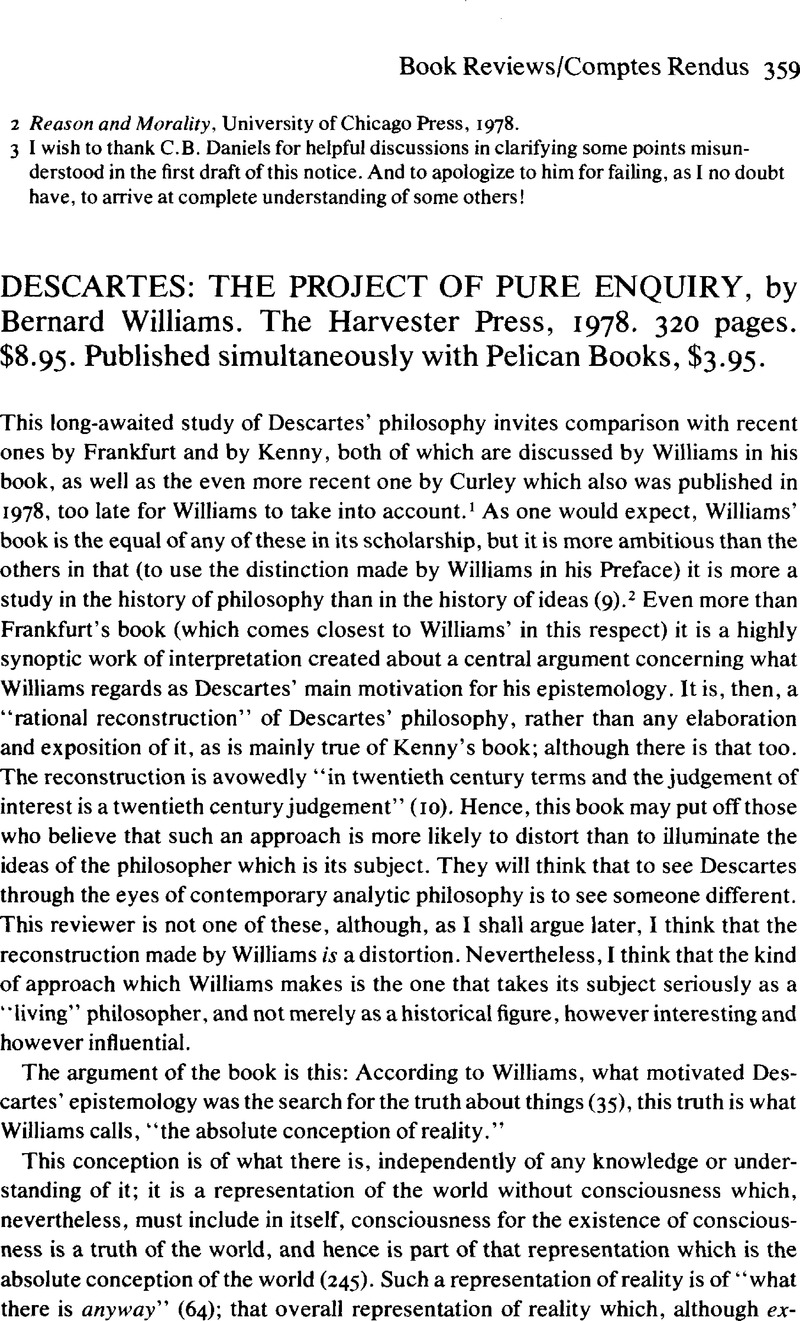No CrossRef data available.
Article contents
Descartes: The project of Pure Enquiry, by Bernard Williams. The Harvester Press, 1978. 320 pages. $8.95. Published simultaneously with Pelican Books, $3.95.
Published online by Cambridge University Press: 05 May 2010
Abstract

- Type
- Book Reviews/Comptes Rendus
- Information
- Dialogue: Canadian Philosophical Review / Revue canadienne de philosophie , Volume 19 , Issue 2 , June 1980 , pp. 359 - 366
- Copyright
- Copyright © Canadian Philosophical Association 1980
References
Notes
1 Frankfurt, Harry, Demons, Dreamers, and Madmen: the Defence of Reason in Descartes' “Meditations”, (New York, 1970)Google Scholar; Kenny, Anthony, Descartes, A Study of his Philosophy, (New York, 1968)Google Scholar; Curley, E.M., Descartes Against the Skeptics (Cambridge, Mass., 1978)CrossRefGoogle Scholar.
2 All of the page numbers of references to the book under review will appear in the body of the review.
3 Oddly, Williams advances a similar argument to the one I give here to show that the incorrigibility of a proposition is insufficient to block Cartesian doubt (86).
4 As Prichard clearly shows in his wonderful critique of the Meditations. “Descartes' ‘Meditations’.” Reprinted in Descartes. A Collection of Critical Essays, edited by Doney, Willis (Garden City, New York, 1967)Google Scholar. See page 150 and especially page 156.
5 As I have more fully argued in “A Defence of Cartesian Doubt,” in this journal (September, 1978).
6 And thus, as I have just indicated, the philosophical skeptic claims not to know it is true. He does this on the further (Cartesian) principle that it follows from doubting that one is in mental state, m, that one is not in mental state m, together with the view that knowing is a mental state. My own reconstruction of the argument of Meditation one can be put in terms of the notion of conditional proof. Thus, what I take Descartes to be arguing there is: given as premisses the conclusions of the “skeptical arguments” in that Meditation, namely that: 1) past deception shows we cannot now trust our senses, 2) dreaming shows the same conclusion, and 3) so does the possibility of an Evil Demon, then, with the assumption that Empiricism is true, we can, (with the additional assumption that knowing is a mental state and that doubting that one in a certain mental state is sufficient for concluding that one is not in that state) derive the conclusion that philosophical skepticism is true. Then, by conditional proof, we can infer the proposition that if Empiricism is true, then philosophical skepticism is true. Of course, Descartes would deny the antecedent of that conditional proposition, and, in Meditation II he argues for its falsity by rebutting the consequent by way of the Cogito.
7 I am very grateful to Professors Robert Howell and Robert Meyers for having commented on an earlier version of this review. Their suggestions helped me very much to clarify my thinking and writing. Naturally, they are, in no way, responsible for my mistakes or misunderstandings.




